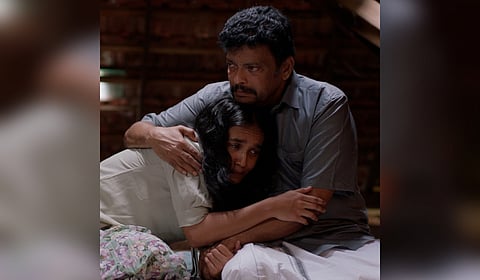'Appuram' movie review: A poignant tale that dismantles superstition
Indu Lakshmi’s Appuram (The Other Side) is a tender yet unflinching portrayal of familial bonds tested by psychological fragility and societal oppression. Selected for the International Competition section at the 29th International Film Festival of Kerala (IFFK), this evocative film weaves an intense drama with a sharp critique of regressive traditions that still persist. Set against the backdrop of a middle-class family, Appuram unfolds through the eyes of Janaki (Anagha Ravi), a teenage girl caught in the crosscurrents of love, fear and societal constraints.
The opening scene, in which Janaki’s mother Chithra makes yet another suicide attempt, sets the tone for the emotionally intense narrative. This harrowing moment introduces a poignant exploration of Janaki’s life, shaped by the constant fear of losing her mother. Through this lens, Appuram delves into the fragile dynamics of a family grappling with mental health challenges, societal expectations, and the oppressive weight of superstition.
Chithra’s character is an unsettling study of a woman unraveling under the weight of unfulfilled aspirations and societal strictures. Once a vibrant and ambitious student, her life was stifled when her father denied her the opportunity to pursue higher education. Mini IG delivers a measured performance, portraying Chithra’s anguish and unpredictable nature with depth. In one particularly heart-rending scene, her refusal to take prescribed medication escalates into a physical confrontation with Janaki, culminating in a vulnerable moment where her husband, Venu (Jagadish), pleads with her not to abandon him and their daughter. Jagadish’s portrayal of Venu is nothing short of exceptional.
His restrained yet deeply emotional performance anchors the narrative, especially in scenes where he attempts to mediate between Chithra’s emotional volatility and Janaki’s growing despair. As an affectionate man grappling with the helplessness of watching the senselessness of what unfolds in Chithra’s ancestral home, his performance is a study in quiet strength. Jagadish’s ability to convey so much with so little is what makes his portrayal of Venu stand out.
At the heart of the film is Janaki, caught between her mother’s stubbornness and her own fears. Anagha Ravi delivers a deeply affecting performance, capturing the intricate layers of a teenager burdened with responsibilities far beyond her years. Janaki’s constant vigilance—checking if her mother is still breathing whenever she sees her asleep—speaks volumes about the psychological toll of living under the shadow of loss.
Appuram also examines the fine line between faith and superstition, particularly as it relates to gender. Janaki’s predicaments in Chithra’s ancestral home are steeped in regressive practices, from menstruation taboos to rituals aimed at exorcising supposed evils. Indu critiques these practices with incisive subtlety, presenting them as both a source of oppression and a reflection of society’s collective anxieties. One striking scene, set in Janaki’s ancestral home, encapsulates this critique. Amidst a discussion about menstruation, an elderly woman claims that if a woman on her period goes near a basil plant, it will wither automatically.
A younger woman counters this superstition, pointing out that no basil plant in her house has ever withered because of her presence. She then questions the relevance of such outdated beliefs in an era when women are breaking barriers, even reaching for the moon. This leads to the dismissive retort: “Women haven’t been to the moon yet.” While technically accurate, it ignores the progress represented by Christina Koch’s upcoming Artemis II mission, which, if successful in 2025, will make her the first woman to travel beyond low Earth orbit.
The scene captures how archaic superstitions persist stubbornly, even as society inches closer to remarkable milestones. The film also welcomingly refrains from entirely vilifying faith, instead presenting it as a double-edged sword—offering solace to some while shackling others. This balanced approach adds depth to the narrative, inviting viewers to grapple with the complex interplay of tradition, fear and agency.
Indu, who made a promising directorial debut with Nila, solidifies her reputation as a sensitive filmmaker once again with Appuram. Her storytelling is marked by restraint and empathy, avoiding melodrama in favour of quiet, contemplative moments. The film’s portrayal of Chithra’s mental illness is particularly commendable, capturing her mood swings and depressive episodes with authenticity, steering clear of both romanticisation and stigma.
Bijibal’s evocative score underlines the film’s emotional beats without overwhelming them, while Rakesh Dharan’s cinematography tenderly captures the intimate spaces of the family’s life. Appu N Bhattathiri’s editing ensures a seamless flow, balancing the film’s focus on individual struggles and broader societal critiques at the same time.
Appuram inevitably invites comparisons to Indu Lakshmi’s previous work as a scriptwriter, Prasanth Vijay’s Daayam, which also centred on a bereaved teenage girl. While Daayam explores grief through the lens of sincerity in mourning, Appuram focuses on Janaki’s promise to her mother, which pushes her into a confrontation with societal taboos. Where Daayam featured a father who vehemently opposed regressive practices, Appuram presents a quieter, more nuanced form of resistance, allowing the emotional stakes and social commentary to unfold with greater subtlety and assurance.
The film follows a relatively simplistic narrative within a proven template, especially with its crowd-pleasing and emotionally rewarding payoff. Still, this film is a mirror held up to a society grappling with the remnants of its patriarchal past, highlighting how gender discrimination and superstition continue to shape lives, often under the guise of care. It lingers long after the credits roll, its questions and emotions resonating. Overall, in its exploration of love, loss, and liberation, Appuram emerges as a profound human story, beautifully crafted and powerfully acted.
Film: Appuram (The Other Side)
Director: Indu Lekshmi
Cast: Jagadish, Mini I G, Anagha Ravi
Rating : 3.5/5 stars

